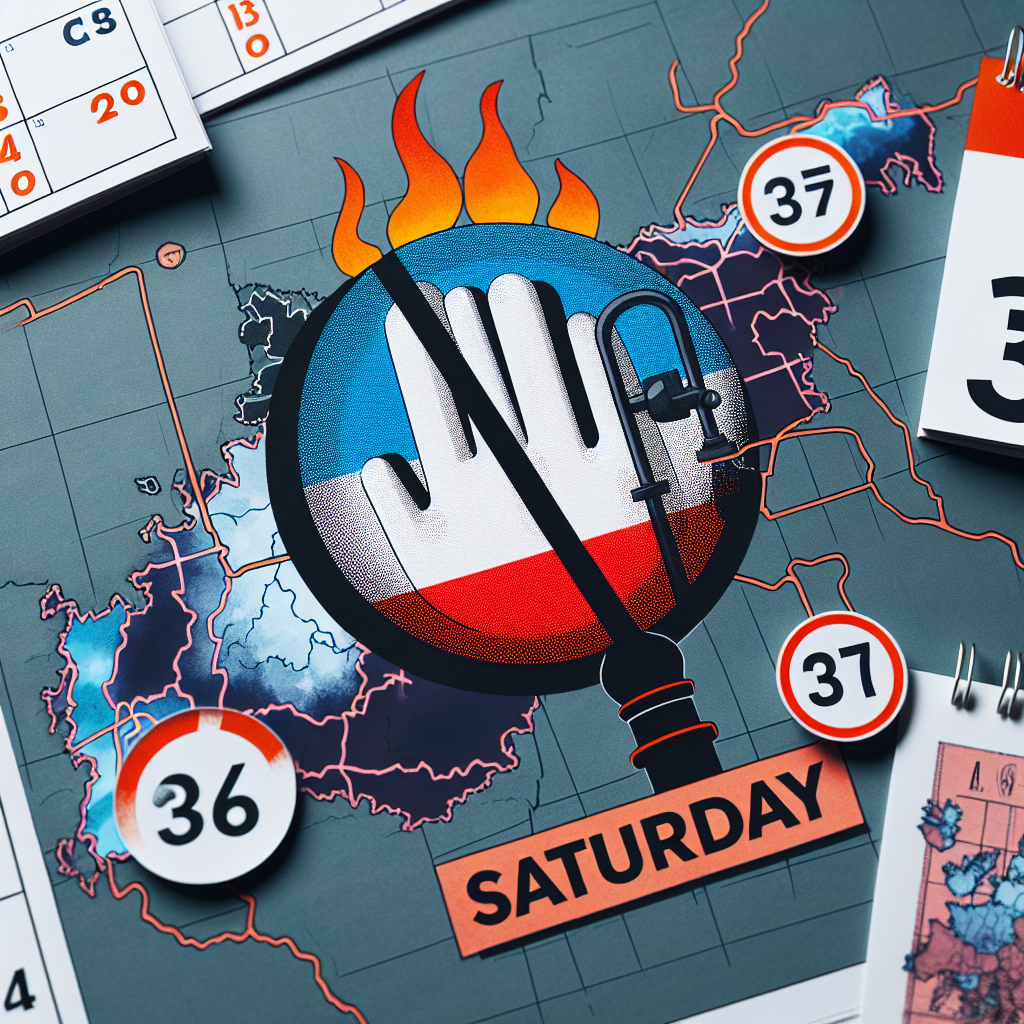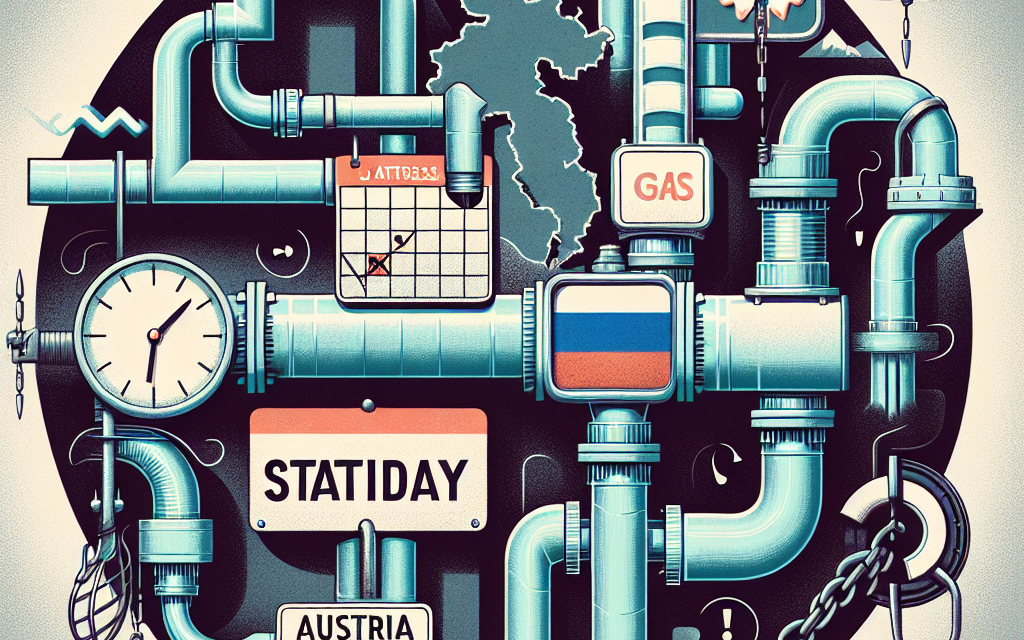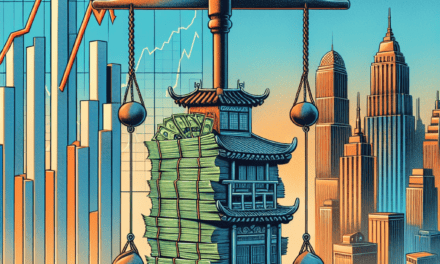“Austria Braces for Energy Shift: Navigating the Future Without Russian Gas”
Introduction
Austria is bracing for a significant energy challenge as it faces a halt in Russian gas supplies starting this Saturday. This development comes amid escalating geopolitical tensions and ongoing economic sanctions, which have disrupted traditional energy trade routes and supply chains. Austria, heavily reliant on Russian gas for its energy needs, is now compelled to explore alternative sources and strategies to mitigate the impact of this supply disruption. The halt in gas supplies is expected to have wide-ranging implications for Austria’s energy security, economic stability, and its commitments to sustainable energy transitions. As the nation prepares for this abrupt change, policymakers and industry leaders are urgently seeking solutions to ensure energy resilience and continuity for both households and industries.
Impact Of Russian Gas Supply Halt On Austria’s Economy
Austria is poised to face a significant challenge as it prepares for the cessation of Russian gas supplies starting this Saturday. This development is expected to have profound implications for the Austrian economy, which has long relied on Russian gas to meet its energy needs. The halt in supply is not merely a logistical issue but a multifaceted economic concern that could ripple through various sectors, affecting everything from industrial production to household energy costs.
To understand the potential impact, it is essential to consider Austria’s current energy landscape. Historically, Austria has been heavily dependent on Russian gas, with a substantial portion of its energy imports coming from Russia. This dependency has been driven by both geographical proximity and long-standing trade agreements. Consequently, the sudden halt in supply necessitates a rapid and strategic response to mitigate potential disruptions.
One immediate concern is the potential increase in energy prices. With the reduction in supply, the basic economic principle of supply and demand suggests that prices could rise, placing additional financial burdens on both businesses and consumers. For industries that are energy-intensive, such as manufacturing and chemical production, increased energy costs could lead to higher operational expenses. This, in turn, might result in reduced competitiveness in international markets, potentially affecting Austria’s export-driven economy.
Moreover, the halt in Russian gas supplies could compel Austria to seek alternative energy sources. This transition, however, is not without its challenges. While Austria has been investing in renewable energy, such as wind and solar power, these sources may not be able to immediately compensate for the shortfall in gas supplies. Additionally, the infrastructure required to import liquefied natural gas (LNG) from other countries is not yet fully developed, posing logistical challenges in the short term.
In the broader context, the halt in gas supplies could also have implications for Austria’s energy policy. It may accelerate the country’s efforts to diversify its energy sources and reduce its reliance on any single supplier. This could lead to increased investments in renewable energy projects and infrastructure, as well as a reevaluation of existing energy agreements and partnerships. Such strategic shifts, while beneficial in the long run, require time and resources to implement effectively.
Furthermore, the economic impact of the gas supply halt is likely to extend beyond the energy sector. As businesses face higher energy costs, there could be a trickle-down effect on employment and consumer spending. Companies may be forced to cut costs, potentially leading to job losses or reduced wages. In turn, this could affect consumer confidence and spending, further impacting the economy.
In conclusion, the halt of Russian gas supplies to Austria presents a complex challenge with far-reaching economic implications. While the immediate focus will be on managing the energy shortfall and stabilizing prices, the situation also presents an opportunity for Austria to reassess and strengthen its energy strategy. By diversifying energy sources and investing in sustainable alternatives, Austria can enhance its energy security and resilience. However, achieving this will require coordinated efforts from both the government and the private sector, as well as a commitment to long-term planning and investment. As Austria navigates this critical juncture, the decisions made today will undoubtedly shape the country’s economic landscape for years to come.
Austria’s Energy Alternatives Amid Russian Gas Crisis
Austria is on the brink of a significant energy challenge as it prepares for a halt in Russian gas supplies starting this Saturday. This development comes amid escalating geopolitical tensions and underscores the urgent need for Austria to explore alternative energy sources. The cessation of Russian gas, which has been a cornerstone of Austria’s energy supply, necessitates a strategic pivot to ensure energy security and economic stability.
Historically, Austria has relied heavily on Russian gas, with imports accounting for a substantial portion of its energy consumption. This dependency has been a point of concern, particularly in light of recent geopolitical developments that have strained relations between Russia and the European Union. The impending halt in gas supplies is a stark reminder of the vulnerabilities associated with such reliance. Consequently, Austria is compelled to accelerate its efforts in diversifying its energy portfolio.
In response to this crisis, Austria is exploring several alternative energy sources. Renewable energy, particularly wind and solar power, is at the forefront of this transition. Austria has already made significant strides in harnessing renewable energy, with hydropower playing a pivotal role in its energy mix. However, the current situation demands an even greater emphasis on expanding wind and solar energy capacities. By investing in these technologies, Austria aims to reduce its dependence on fossil fuels and enhance its energy resilience.
Moreover, Austria is considering increasing its imports of liquefied natural gas (LNG) from other countries. This strategy involves establishing new trade partnerships and investing in the necessary infrastructure to accommodate LNG imports. While this approach offers a viable short-term solution, it also presents challenges, such as the need for substantial financial investment and the environmental implications associated with LNG production and transportation.
In addition to exploring alternative energy sources, Austria is also focusing on energy efficiency measures. By implementing policies that promote energy conservation and efficiency, Austria can reduce its overall energy demand. This includes initiatives aimed at improving the energy efficiency of buildings, industrial processes, and transportation systems. Such measures not only contribute to energy security but also align with Austria’s commitment to reducing carbon emissions and combating climate change.
Furthermore, Austria is engaging in regional cooperation to address the energy crisis. Collaborating with neighboring countries to develop integrated energy networks and share resources can enhance energy security across the region. This approach fosters a sense of solidarity and collective resilience, enabling countries to support each other in times of need.
As Austria navigates this challenging period, it is clear that the transition to a more sustainable and diversified energy system is not only necessary but also inevitable. The halt in Russian gas supplies serves as a catalyst for change, prompting Austria to accelerate its efforts in building a robust and resilient energy infrastructure. While the road ahead may be fraught with challenges, Austria’s commitment to exploring alternative energy sources and enhancing energy efficiency offers a promising path forward.
In conclusion, the Russian gas supply halt presents Austria with both a challenge and an opportunity. By embracing renewable energy, increasing LNG imports, and promoting energy efficiency, Austria can mitigate the impact of this crisis and pave the way for a more sustainable energy future. As the nation adapts to these changes, it sets an example for others in the region, demonstrating the importance of resilience and innovation in the face of adversity.
How Austria Is Preparing For A Potential Energy Shortage
Austria is on the brink of a significant energy challenge as it faces the imminent cessation of Russian gas supplies starting this Saturday. This development has prompted the Austrian government to implement a series of strategic measures aimed at mitigating the potential impact of an energy shortage. As the nation braces for this disruption, it is crucial to understand the steps being taken to ensure energy security and stability.
In response to the looming halt in Russian gas supplies, Austria has intensified its efforts to diversify its energy sources. Recognizing the risks associated with over-reliance on a single supplier, the Austrian government has been actively seeking alternative energy partners. This includes increasing imports from neighboring countries and exploring new agreements with other international suppliers. By broadening its energy portfolio, Austria aims to reduce its vulnerability to external supply shocks and enhance its energy resilience.
Moreover, Austria is accelerating its transition towards renewable energy sources. The government has been investing heavily in the development of wind, solar, and hydroelectric power projects. These initiatives are not only part of Austria’s long-term strategy to combat climate change but also serve as a crucial buffer against potential energy shortages. By expanding its renewable energy capacity, Austria is positioning itself to meet a significant portion of its energy needs domestically, thereby reducing its dependence on foreign gas supplies.
In addition to diversifying energy sources, Austria is also focusing on energy efficiency measures. The government has launched campaigns to encourage both businesses and households to adopt energy-saving practices. This includes promoting the use of energy-efficient appliances, improving building insulation, and encouraging behavioral changes that reduce energy consumption. By decreasing overall energy demand, Austria can better manage its existing resources and lessen the impact of any supply disruptions.
Furthermore, Austria is enhancing its energy storage capabilities to better cope with potential shortages. The government is investing in advanced energy storage technologies, such as battery systems and pumped hydro storage, which can store excess energy generated during periods of low demand and release it when needed. These storage solutions are critical for balancing supply and demand, especially during times of uncertainty in energy supply.
In parallel, Austria is strengthening its energy infrastructure to ensure a reliable distribution network. Upgrading pipelines, expanding grid capacity, and enhancing interconnections with neighboring countries are all part of Austria’s strategy to maintain a stable energy supply. These infrastructure improvements are designed to facilitate the efficient transport of energy across the country and to ensure that any available resources are effectively utilized.
As Austria prepares for the potential energy shortage, the government is also prioritizing communication and collaboration with key stakeholders. Regular consultations with industry leaders, energy experts, and international partners are being conducted to share information, coordinate efforts, and develop contingency plans. This collaborative approach is essential for addressing the complex challenges posed by the halt in Russian gas supplies.
In conclusion, Austria is taking a comprehensive and proactive approach to prepare for the potential energy shortage resulting from the cessation of Russian gas supplies. By diversifying energy sources, investing in renewables, promoting energy efficiency, enhancing storage capabilities, and strengthening infrastructure, Austria is working diligently to safeguard its energy security. Through these measures, the nation aims to navigate the current challenges while laying the groundwork for a more sustainable and resilient energy future.
The Role Of Renewable Energy In Austria’s Energy Strategy

Austria is on the brink of a significant shift in its energy landscape as it faces the cessation of Russian gas supplies starting this Saturday. This development underscores the urgent need for Austria to reassess and potentially accelerate its renewable energy strategy. Historically, Austria has relied heavily on Russian gas, which has been a cornerstone of its energy supply. However, the current geopolitical tensions and the impending halt in gas supplies have highlighted the vulnerabilities associated with such dependence. Consequently, Austria is now compelled to explore alternative energy sources to ensure energy security and sustainability.
In recent years, Austria has made commendable strides in integrating renewable energy into its national energy strategy. The country has long been a proponent of hydropower, which currently accounts for a significant portion of its electricity generation. This reliance on hydropower has provided Austria with a relatively clean and sustainable energy source, reducing its carbon footprint and aligning with global environmental goals. However, the potential halt in Russian gas supplies necessitates a broader diversification of renewable energy sources beyond hydropower.
To this end, Austria has been increasingly investing in wind and solar energy. The expansion of wind farms, particularly in the eastern regions of the country, has been a focal point of Austria’s renewable energy strategy. These efforts are complemented by advancements in solar technology, which have made solar power a more viable and cost-effective option. By harnessing the power of the sun and wind, Austria aims to reduce its reliance on fossil fuels and enhance its energy independence.
Moreover, the Austrian government has been proactive in implementing policies that support the transition to renewable energy. Incentives for renewable energy projects, coupled with stringent regulations on carbon emissions, have created a conducive environment for the growth of the renewable energy sector. These measures are designed to encourage both public and private investment in renewable energy infrastructure, thereby accelerating the transition towards a more sustainable energy system.
In addition to expanding its renewable energy capacity, Austria is also focusing on energy efficiency as a critical component of its energy strategy. By promoting energy-saving technologies and practices, Austria aims to reduce overall energy consumption, thereby mitigating the impact of potential energy supply disruptions. This approach not only supports environmental sustainability but also enhances economic resilience by reducing energy costs for consumers and businesses alike.
Furthermore, Austria’s commitment to renewable energy is reflected in its participation in international collaborations aimed at addressing global energy challenges. By engaging with other nations and sharing best practices, Austria is contributing to the development of innovative solutions that can be applied both domestically and globally. These collaborative efforts are essential for fostering a collective response to the pressing issue of energy security in the face of geopolitical uncertainties.
In conclusion, the impending halt of Russian gas supplies presents both a challenge and an opportunity for Austria. While the immediate concern is to secure alternative energy sources to meet domestic demand, this situation also serves as a catalyst for Austria to further strengthen its renewable energy strategy. By continuing to invest in renewable energy technologies and infrastructure, Austria can enhance its energy independence, contribute to global environmental goals, and ensure a sustainable energy future for its citizens. As the country navigates this critical juncture, the role of renewable energy in Austria’s energy strategy will undoubtedly become increasingly pivotal.
Austria’s Diplomatic Efforts To Secure Energy Supplies
Austria is poised to confront a significant challenge as Russian gas supplies are set to be halted starting Saturday. This development has prompted the Austrian government to intensify its diplomatic efforts to secure alternative energy sources and ensure the stability of its energy supply. The cessation of Russian gas, a critical component of Austria’s energy mix, underscores the urgency with which the nation must act to mitigate potential disruptions and maintain energy security.
In recent years, Austria has been heavily reliant on Russian gas, with a substantial portion of its energy needs being met through imports from Russia. This dependency has been a point of concern, particularly in light of geopolitical tensions and the increasing volatility of international energy markets. The impending halt in gas supplies from Russia has therefore accelerated Austria’s diplomatic initiatives to diversify its energy sources and reduce its reliance on a single supplier.
To address this pressing issue, Austria has been actively engaging with neighboring countries and potential energy partners. The government has prioritized strengthening ties with European Union member states, emphasizing the importance of regional cooperation in energy security. By fostering closer relationships with countries such as Germany and Italy, Austria aims to explore opportunities for shared energy infrastructure and joint investments in renewable energy projects. These efforts are intended to create a more resilient and interconnected energy network that can withstand external shocks.
Moreover, Austria has been in discussions with non-European energy producers to secure alternative gas supplies. The government has reached out to countries in the Middle East and North Africa, exploring possibilities for importing liquefied natural gas (LNG) as a viable substitute for Russian gas. These diplomatic overtures are part of a broader strategy to diversify Austria’s energy portfolio and reduce its vulnerability to supply disruptions.
In addition to seeking new energy partners, Austria is also focusing on enhancing its domestic energy production capabilities. The government has announced plans to accelerate the development of renewable energy sources, such as wind, solar, and hydropower. By investing in these sustainable energy technologies, Austria aims to increase its energy independence and contribute to the global transition towards cleaner energy solutions. This shift not only aligns with Austria’s environmental commitments but also serves as a strategic move to bolster its energy security in the long term.
Furthermore, Austria is actively participating in European Union initiatives aimed at enhancing energy resilience across the continent. The country is advocating for the establishment of a unified European energy policy that prioritizes diversification, sustainability, and security. By collaborating with EU partners, Austria seeks to leverage collective resources and expertise to address common energy challenges and ensure a stable supply for all member states.
In conclusion, the impending halt of Russian gas supplies has prompted Austria to intensify its diplomatic efforts to secure alternative energy sources. Through regional cooperation, engagement with non-European energy producers, and investments in renewable energy, Austria is taking proactive steps to safeguard its energy security. These efforts reflect a broader commitment to reducing dependency on a single supplier and enhancing resilience in the face of evolving geopolitical dynamics. As Austria navigates this critical juncture, its diplomatic initiatives will play a pivotal role in shaping the country’s energy future and ensuring a stable and sustainable energy supply for its citizens.
The Effect Of Gas Supply Disruption On Austrian Households
Austria is bracing for a significant challenge as it faces the imminent halt of Russian gas supplies starting this Saturday. This development is poised to have profound implications for Austrian households, which have long relied on Russian gas as a primary energy source. The disruption in supply is not merely a logistical issue but a multifaceted problem that could affect various aspects of daily life, from heating homes to powering industries.
To understand the potential impact on Austrian households, it is essential to consider the country’s energy landscape. Austria has historically depended on Russia for a substantial portion of its natural gas needs, with Russian gas accounting for nearly 80% of its imports. This reliance has been a cornerstone of Austria’s energy strategy, providing a stable and relatively affordable energy source. However, the sudden cessation of these supplies necessitates a rapid adjustment to alternative energy sources, which may not be readily available or economically viable in the short term.
In the immediate aftermath of the supply halt, Austrian households are likely to experience increased energy costs. As demand for alternative energy sources such as liquefied natural gas (LNG) and renewable energy rises, prices are expected to surge. This price hike will inevitably trickle down to consumers, leading to higher utility bills. For many households, particularly those with fixed or low incomes, this could result in financial strain, forcing them to make difficult choices between essential expenses.
Moreover, the disruption could lead to energy shortages, especially during peak demand periods in the winter months. Austrian households may face the prospect of rationed energy supplies, which could affect heating and electricity usage. In such scenarios, the government may need to implement measures to prioritize energy distribution, ensuring that critical services and vulnerable populations receive adequate supplies. This could involve encouraging energy conservation practices among the general public and promoting the use of energy-efficient appliances.
In addition to the immediate economic and logistical challenges, the gas supply halt also underscores the need for Austria to diversify its energy sources. The current situation highlights the risks associated with over-reliance on a single supplier, particularly in a geopolitically volatile context. In response, Austria may accelerate its transition towards renewable energy, investing in wind, solar, and hydroelectric power to reduce its dependency on external sources. This shift, while beneficial in the long term, requires substantial investment and infrastructure development, which may not yield immediate results.
Furthermore, the government may explore regional cooperation with neighboring countries to secure alternative gas supplies. By strengthening ties with other European nations, Austria can enhance its energy security and mitigate the impact of future disruptions. Such collaborations could involve shared infrastructure projects, joint investments in energy storage technologies, and coordinated policy frameworks to ensure a stable and resilient energy supply.
In conclusion, the halt of Russian gas supplies presents a formidable challenge for Austrian households, with potential repercussions on energy costs, availability, and security. While the immediate effects may be challenging, this situation also offers an opportunity for Austria to reassess its energy strategy and pursue a more diversified and sustainable energy future. By embracing innovation and regional cooperation, Austria can navigate this crisis and emerge with a more resilient energy system that better serves its households and economy.
Austria’s Long-Term Energy Security Plans In Light Of Russian Gas Halt
Austria is poised to face a significant shift in its energy landscape as Russian gas supplies are set to halt starting Saturday. This development marks a pivotal moment for the nation, which has historically relied heavily on Russian gas to meet its energy needs. The cessation of gas supplies from Russia necessitates a reevaluation of Austria’s long-term energy security plans, prompting both immediate responses and strategic adjustments to ensure a stable energy future.
In recent years, Austria has been increasingly aware of the vulnerabilities associated with its dependence on Russian gas. The geopolitical tensions and economic sanctions involving Russia have underscored the risks of relying on a single source for a substantial portion of its energy supply. Consequently, Austria has been actively exploring alternative energy sources and diversifying its energy portfolio to mitigate these risks. The halt in Russian gas supplies accelerates the urgency of these efforts, compelling Austria to expedite its transition towards a more resilient and sustainable energy system.
One of the primary strategies Austria is employing to enhance its energy security is the diversification of its energy sources. This involves increasing investments in renewable energy, such as wind, solar, and hydropower, which are abundant and sustainable options within the country. By expanding its renewable energy capacity, Austria aims to reduce its reliance on imported fossil fuels and decrease its carbon footprint, aligning with broader European Union goals for climate neutrality. Moreover, the development of renewable energy infrastructure not only bolsters energy security but also stimulates economic growth and job creation within the country.
In addition to renewable energy, Austria is exploring the potential of liquefied natural gas (LNG) as an alternative to Russian gas. The establishment of LNG terminals and the strengthening of partnerships with other gas-producing nations are crucial steps in this direction. By diversifying its gas supply sources, Austria can enhance its energy resilience and reduce the impact of supply disruptions from any single country. Furthermore, the integration of LNG into Austria’s energy mix provides a transitional solution as the nation gradually shifts towards a more sustainable energy future.
Austria is also focusing on enhancing energy efficiency across various sectors. By implementing energy-saving measures and promoting technological innovations, the country can reduce its overall energy consumption and lessen its dependence on external energy sources. This approach not only contributes to energy security but also supports Austria’s commitment to environmental sustainability and climate change mitigation.
The halt in Russian gas supplies serves as a catalyst for Austria to accelerate its energy transition and fortify its long-term energy security plans. While challenges remain, the situation presents an opportunity for Austria to emerge as a leader in sustainable energy practices within Europe. By prioritizing diversification, investing in renewable energy, and enhancing energy efficiency, Austria can build a robust and resilient energy system that withstands external shocks and aligns with global sustainability goals.
In conclusion, the impending halt of Russian gas supplies to Austria underscores the critical importance of energy security and diversification. As Austria navigates this transition, the nation is poised to redefine its energy landscape, embracing renewable energy and innovative solutions to ensure a stable and sustainable energy future. Through strategic planning and proactive measures, Austria can not only address the immediate challenges posed by the gas supply halt but also pave the way for a more secure and environmentally responsible energy system in the years to come.
Q&A
1. **What is the main issue?**
Austria is facing a halt in Russian gas supplies starting Saturday.
2. **Why is the gas supply being halted?**
The specific reasons for the halt in gas supply are not detailed, but it could be due to geopolitical tensions, contractual disputes, or sanctions.
3. **How reliant is Austria on Russian gas?**
Austria is significantly reliant on Russian gas, with a large portion of its energy needs traditionally met by imports from Russia.
4. **What are the potential impacts on Austria?**
The halt could lead to energy shortages, increased energy prices, and potential disruptions in heating and industrial operations.
5. **What measures is Austria taking to address the situation?**
Austria may seek alternative gas suppliers, increase energy imports from other countries, or tap into strategic reserves to mitigate the impact.
6. **How might this affect Austria’s economy?**
The halt could strain Austria’s economy by increasing energy costs, affecting industrial output, and potentially leading to inflationary pressures.
7. **What are the broader implications for Europe?**
The situation highlights Europe’s energy dependency on Russia and may accelerate efforts to diversify energy sources and enhance energy security across the continent.
Conclusion
Austria is set to face a halt in Russian gas supplies starting Saturday, a development that could significantly impact the country’s energy security and economic stability. This disruption comes amid heightened geopolitical tensions and could lead to increased energy prices, potential shortages, and a push for Austria to diversify its energy sources. The halt underscores the vulnerability of countries heavily reliant on Russian gas and may accelerate Austria’s transition towards alternative energy solutions and suppliers. The situation necessitates urgent strategic planning and collaboration with European partners to mitigate the immediate effects and ensure long-term energy resilience.





